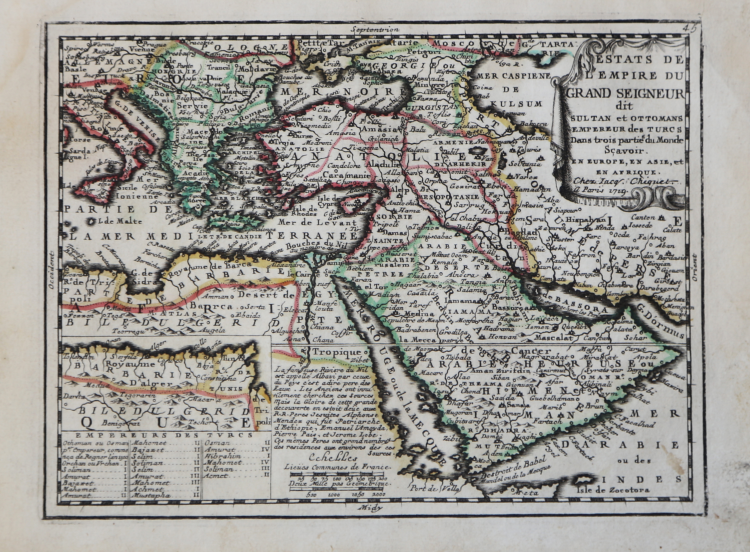



| Reference: | S29295 |
| Author | Jacques CHIQUET |
| Year: | 1719 ca. |
| Zone: | Turkish Empire |
| Printed: | Paris |
| Measures: | 225 x 165 mm |


| Reference: | S29295 |
| Author | Jacques CHIQUET |
| Year: | 1719 ca. |
| Zone: | Turkish Empire |
| Printed: | Paris |
| Measures: | 225 x 165 mm |
Beautiful map from Le nouveau et curieux Atlas geographique et historique, ou le divertissement des Empereurs, Roys et Princes tant dans la guerre que dans la paix... by Jacques Chiquet, printed in Paris in 1719.
Jacques Chiquet (Paris 1673-1721) was a French writer, publisher, and print dealer. Chiquet was taught at a very young age by François Jollain called the Elder (1641?-1704), a copperplate engraver. He married Marguerite Boucher in 1697 and established himself as a publisher on the rue Saint-Jacques. As early as 1713 he was known to run a store under the sign "Grand Saint-Henry," and his business seemed to prosper. Chiquet's collection consisted mainly of popular engravings, dealing with common and very often imitated subjects, but also included sacred engravings, maps, and wall calendars.. Many of these prints were sold by Chiquet through peddlers mainly from Coutances in Normandy, where he had an agent representing his interests. Chiquet also published two atlases in 1719: Le nouveau et curieux Atlas geographique et historique, intended for a wealthy audience, and the more accessible Nouvel Atlas François . When Marguerite died, she continued the publishing business, not without success; she sold prints in rue Saint-Jacques, "À la ville de Cologne et à l'image de Saint-Cécile." Their daughter, Marguerite-Geneviève Chiquet (? -May 11, 1773) married the famous engraver Jacques Chéreau in 1724. When Marguerite died (1741), Jacques Chéreau took over the Chiquet family estate.
Etching, contemporary outline coloring, in very good condition.
Jacques CHIQUET (Parigi 1673 - 1721)
|
Jacques Chiquet, born in 1673 in Paris where he died in October 1721. He was a French writer, publisher, and print dealer. Born in Paris in 1673, Jacques Chiquet was taught at a very young age of 9 by François Jollain called the Elder (1641?-1704), a copperplate engraver. He married in 1697 Marguerite Boucher, whom he met through his teacher. With a first set of brasses, he established himself as a publisher on the rue Saint-Jacques. As early as 1713 he was known to run a store under the sign "Grand Saint-Henry," and his business seemed to thrive. Chiquet's collection consists mainly of popular engravings, dealing with common and very often imitated subjects. Chiquet seems to have had no privileges or very few. There are sacred engravings, maps, and wall calendars. One of the most famous series of engravings is the "Cries" (trades) of Paris. Many of these prints were sold by Chiquet through peddlers mainly from Coutances in Normandy, where he had an agent representing his interests. Chiquet also published two atlases in 1719: Le nouveau et curieux Atlas geographique et historique, intended for a wealthy audience, and the more accessible Nouvel Atlas François . When he died in 1721, the inventory was carried out by bookseller François Babuty and revealed 1,900 copper coins and 90,000 prints worth £9,000. His widow, Marguerite, continued the publishing business, not unsuccessfully; she sold the prints on rue Saint-Jacques, "À la ville de Cologne et à l'image de Saint-Cécile." Their daughter, Marguerite-Geneviève Chiquet (? -May 11, 1773) married the famous engraver Jacques Chéreau in 1724. When Marguerite Chiquet died (1741) she left 2,500 copper coins and about 210,000 prints worth 21,000 pounds. Jacques Chéreau took over the Chiquet family estate.
|
Jacques CHIQUET (Parigi 1673 - 1721)
|
Jacques Chiquet, born in 1673 in Paris where he died in October 1721. He was a French writer, publisher, and print dealer. Born in Paris in 1673, Jacques Chiquet was taught at a very young age of 9 by François Jollain called the Elder (1641?-1704), a copperplate engraver. He married in 1697 Marguerite Boucher, whom he met through his teacher. With a first set of brasses, he established himself as a publisher on the rue Saint-Jacques. As early as 1713 he was known to run a store under the sign "Grand Saint-Henry," and his business seemed to thrive. Chiquet's collection consists mainly of popular engravings, dealing with common and very often imitated subjects. Chiquet seems to have had no privileges or very few. There are sacred engravings, maps, and wall calendars. One of the most famous series of engravings is the "Cries" (trades) of Paris. Many of these prints were sold by Chiquet through peddlers mainly from Coutances in Normandy, where he had an agent representing his interests. Chiquet also published two atlases in 1719: Le nouveau et curieux Atlas geographique et historique, intended for a wealthy audience, and the more accessible Nouvel Atlas François . When he died in 1721, the inventory was carried out by bookseller François Babuty and revealed 1,900 copper coins and 90,000 prints worth £9,000. His widow, Marguerite, continued the publishing business, not unsuccessfully; she sold the prints on rue Saint-Jacques, "À la ville de Cologne et à l'image de Saint-Cécile." Their daughter, Marguerite-Geneviève Chiquet (? -May 11, 1773) married the famous engraver Jacques Chéreau in 1724. When Marguerite Chiquet died (1741) she left 2,500 copper coins and about 210,000 prints worth 21,000 pounds. Jacques Chéreau took over the Chiquet family estate.
|